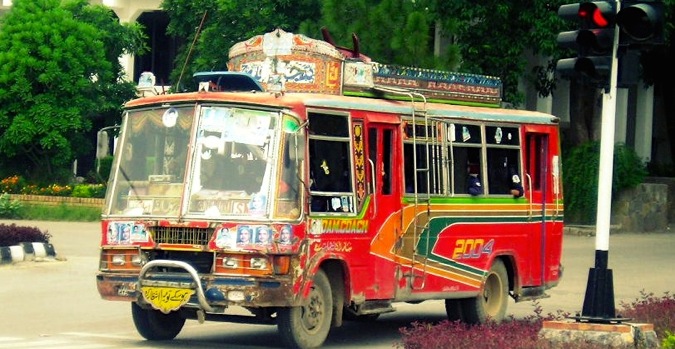Pakistan Travel Guide: Public Transport Options

Numerous public transportation options exist for traveling around Pakistan. Budget travelers can take advantage of cheap rates on buses, economy class train tickets and minivans, while those who prefer to travel more comfortably can opt for privately hired vehicles or quick flights between far-flung destinations.
1. Bus
Buses connect most cities in Pakistan and are an economical way to travel. Information on tickets, fares and schedules can be accessed at city bus stands, although larger companies like Daewoo, Skyways and NATCO also have websites and customer service offices where you can get information and reserve seats. Buses are air-conditioned or non air-conditioned, and some travel by motorway while others travel by local roads and stop at multiple villages. If you’re traveling between major cities, make sure to purchase a seat on a motorway route.
If you’re willing to spend more for punctuality and service, Daewoo is the way to go. Daewoo stations are located in more suburban areas of cities as opposed to the general, more hectic bus stations. All buses are accompanied by at least one female hostess, and the rate includes refreshments. Daewoo buses stop at nicer roadside service stations instead of small, dingy hotels.
Pros: Bus is an inexpensive way to travel between cities.
Cons: General bus stands can be confusing; you need to make sure you’re buying a ticket on the type of bus you want to travel by and for the correct route. Female travelers may be refused a ticket if no “lady seats” (seats next to another lady) are available, although you can usually get around this by asking a married couple to swap seats so you can sit with the wife and the husband can sit with another male passenger.
2. Train
The extensive Pakistan rail network connects the major cities of Karachi, Quetta, Lahore, Rawalpindi, Peshawar, Multan, Hyderabad and many smaller cities in between. Six passenger classes exist to cater to different budgets, although not all train routes have all classes.
Most trains have (in order from most expensive to least expensive) AC sleeper, Business class and Economy.
Pros: If you’re willing to pony up the dough for a nicer seat, traveling by train is often more comfortable than by bus. Business class is about the same price as traveling by air-conditioned bus, and economy class train tickets are cheaper than most bus tickets.
Cons: Pakistani trains don’t have the best safety record and often run late. Buying tickets at larger stations can be a hectic affair.
3. Plane
Two airlines operate domestic flights in Pakistan: Pakistan International Airlines and Air Blue.
Pros: For long-distance travel, you’ll get to your destination much faster. A 24-hour train ride from Lahore to Karachi is only 2.5 hours by plane.
Cons: Air travel can cost ten times as much as land transport. Flights to and from the Northern Areas are often cancelled due to inclement weather, and it can takes days or weeks to rebook passengers. The recent deadly crash of AirBlue flight 152 has brought Pakistan air safety under scrutiny.
4. Minibus, Van or Suzuki
Between smaller villages the only transportation options are often minibuses, vans or Suzuki trucks converted into tiny buses by putting a waterproof cover over the pick-up bed. This transport is what most locals use; you’ll need to show up at a bus stand or flag one down to inquire about routes, fares and schedules.
The vehicles usually wait around at bus stations until they are filled to capacity. Passengers pay per seat for the route they want to travel; drivers may be hesitant to take passengers not planning to travel the entire route.
Pros: Taking these shared vehicles ends up being much cheaper than a taxi, jeep or other privately hired vehicle. In mountain areas, these smaller vehicles can navigate washouts and slide areas better than full-size buses.
Cons: Expect cramped conditions unless you’re willing to buy multiple seats. In warm weather, you’ll be up close and personal with other passengers who may or may not be wearing deodorant, and on mountain roads you could end up with somebody else’s vomit in your lap.
In Suzuki trucks, women are expected to sit in the innermost seats where the airflow is limited, whereas male passengers have the option of standing on the back instead of sitting.
5. Taxis and Jeeps
Most Pakistanis don’t use taxis to go between cities where bus routes are established, but if you want to take a day trip to a specific attraction or get dropped off at a certain point or trailhead, a privately hired taxi or jeep may be the only option. In major cities you can contact Metro Cab, a reputable service operating in and around Karachi, Hyderabad, Peshawar, Islamabad and Lahore. You may pay a little bit more, but taxis are metered and drivers are accountable to a central office. This option is recommended for female passengers, especially those traveling alone after dark.
Jeeps serve as mountain taxis in the Northern Areas and many parts of Khyber-Pakhtoonkhwa (formerly NWFP). You can hire jeeps through hotels, travel agencies, and hiking/trekking companies.
Pros: Traveling by taxi or jeep is more flexible since you don’t have to wait for other passengers. You’ll have more space to sit comfortably and will often get a better view than in a minibus, van or Suzuki. You can also ask your driver to stop whenever you’d like to eat, drink, get out or take photographs.
Cons: Hiring a private vehicle is more expensive than buying a seat on a shared vehicle.
For more on transportation in Pakistan:
Daewoo Pakistan
Pakistan Railways
Pakistan International Airlines
AirBlue
MetroCab
This article was first published in 2011 on Associated Content.
Images
Featured image by Shubert Ciencia


Pingback: Travel Guide | Travelguide
I frequently use MetroCab in both Karachi and Islamabad. I asked for a Metrocab on Thursday 16th of April to be sent at 7 to take me from Gulshan-e-Iqbal (Karachi) to Abdullah Shah Qazi’s Mazaar. I was told its flat charge of 550 Rupees. Once the taxi arrived, I decided to stop at Gulshan Chowrangi for 5 minutes. The driver told me the package would change from 550 Rupees for 15 Kms to 610 Rupees for 12 kms and additional 25 rupees per km’s after that. I agreed. When I was getting off the taxi at Gulshan Chowrangi, there wasnt sufficient parking so I asked the driver to give me his cell number so its easy to trace the cab. He told me it was company policy not to let drivers give out their cell numbers. Keep in mind, when the driver arrives to pick you up, he calls you from his cell to inform you or if he cant find your pick up point. The driver told me he would parked infront of the next building adjacent to the one I was going in. When I came out, he was no where to be seen. So I called 021-35393951, the number that had informed me m taxi had arrived to pick me from Gulshan. This guy had a very rude attitude from the start. He told me I shouldnt have gotten off the taxi and stopped at Gulshan Chowrangi, and that the taxi was waiting in front of a CNG station and I should walk to it. The CNG station was no where in the line of sight. I asked him to tell the driver to come to the spot where he dropped me. He responded with ‘Kya museebat hai’ and then asked me ‘You want him to come the wrong way?’ very sarcastically. I told him I wanted him to take a u turn and come back and he wasnt doing me any favours, its a charged service I am paying for. He hung up on and didnt take my call after that. I was left standing in the middle of no where, with no contact with the taxi. This is the brilliant customer service you get from Metro Cab. The person who hung up on me was either Mr. Sheraz or Noman because only these two were on duty. I then called their complaint number and informed Mr. Mansoor of the incident. He said strict action would be taken within 24 hours and I would be informed. Its been 2 days now, nothing. The whole company from top to bottom is being run by imbeciles and it seems its a company policy to not give a damn. I would like to get in touch with the owner and inform him of how things are being run by employees.
Being a citizen of Karachi i would like to tell all those who are visiting Pakistan, Karachi for the 1st time is that they can use Ober, Careem or Bikea at reasonable charges. Plus, You can switch buses from every where which is alot more easier.
But our buses are not well maintained and you might get a bumpy rides 😉